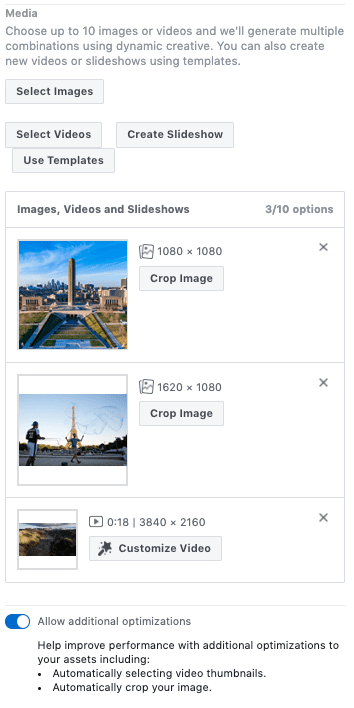Facebook Dynamic Creative: Level Up Your Ads

One of the largest issues when dealing with ads on social media can be summed up in one question. “Are my ads good ads?” We can break that down by wondering if our ad copy is informative or playful enough if our ad copy is too long or too short, if the images we are using resonate with our audience, or even if we should be using video instead of an image. Additionally, as the busy people we are, time is always a limiting factor in being able to test all these things. Not to mention that all these things could be completely different for the objective we are trying to achieve; like purchases, sign-ups, or just landing page views. This is where we have the opportunity to level up our Facebook ads by using a feature called dynamic creative.
How Does Dynamic Creative Work?
Facebook’s dynamic creative feature is very easily explained. You give an ad several options for images, ad copy, and headlines, then it combines all these to find what variation/combination works best for your given objective. This takes the work out of having to set up 15 different ads or 10 different A/B tests to find out what works. Instead, it puts all that into one single ad so we can get results and learnings in real-time.
How To Set Up Dynamic Creative
Setting up dynamic creative is the first and easiest step to leveling up your ads. The setting for dynamic creative can be found at the ad set level and is a simple button you click on or off. After enabling it, finish setting up your ad set and continue on to creating your ads.

At the ad level, you will now have the option of adding multiple images, ad copy, and headlines to your ad. You can select up to 10 different images/videos/slideshows, 5 text variations, 5 headline variations, 5 newsfeed link description variations, and 5 call to actions. I would also recommend using the allow additional optimizations button as well for even more ad variation.

Getting The Most Out Of Dynamic Creative
The biggest mistake you can make when using dynamic creative is not being unique enough with the options you provide to the ad. The last thing you want to do is just have images and ad copy that are extremely similar to one another. This is your opportunity to answer those question you’ve had but never had time to test. Here are my tips below. Though the list isn’t all-inclusive of ideas, I hope you understand the general idea behind them.
- Avoid trying to test small things like capitalization on one headline or using an exclamation point in your text instead of a period.
- Add a mixture of images and video into one ad if possible.
- If using video, try to keep its length under 15 seconds with branding early for best results
- Use different types of images. Think about having pictures with people and without people. Think about images of real-life vs images that are infographics. Think about images of people using the product or just the product itself.
- Be bold with your ad copy. Make one variation short and sweet, then make one long and informative. Don’t be afraid to be playful either, try adding emojis to one variation.
- Try headlines that are a bit softer on call to action and try some that are a bit more upfront about encouraging action.
Facebook Dynamic Creative In Action. Real-World Results From A Real World Advertiser.
The theory behind dynamic creative is great. But does it actually work? Well in my experience it has worked wonderfully. It not only has improved my KPIs but it has given me valuable learnings about my ads to help me create future ads.
In one example, I tested dynamic creative vs non-dynamic across four countries and several markets within those countries. One phase of testing used only traditional ads and the following phase used dynamic creative. Here are the results.
- 39% more people reached with dynamic creative
- 111% increase in clicks with dynamic creative
- 51% increase in conversion rate with dynamic creative
- 96% higher return on ad spend with dynamic creative
What was the spend different between the two types? With traditional ads we spent $44,000 and with dynamic we spent $33,000. So not only did we achieve greater results but we did it with less budget. You can read the full case study here.



